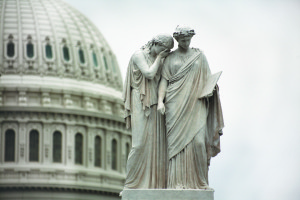
By Pat Higgins | Asst. Sports Editor
The government shutdown may be over and the fight to raise the debt ceiling got a temporary reprieve, but economic experts said the coming budget battles will be much more significant.
Last week, President Barack Obama signed a deal that passed Congress to end the 16-day shutdown, bringing 800,000 furloughed federal employees back to work. A 285-144 vote in the House and an 81-18 tally in the Senate ended a two week period of tense political debate in which legislative failure in the world’s largest economy threatened global markets.
It was the first time the federal government shut down since 1996, and according to Standard & Poor’s, the stoppage cost the U.S. economy $24 billion.
Antony Davies, an associate professor of economics in the Palumbo Donahue School of Business, said the figure is insignificant over the course of a year.
“Twenty-four billion [dollars] seems like a lot, but it is about one-tenth of one-percent of U.S. economic output. Random fluctuations in the economy cause greater disturbances than this on a regular basis,” he said. “The federal government spends $10 billion every 24 hours; $24 billion is about 60 hours’ worth of government spending.”
According to S&P, there is a less than one in three chance of a change in the country’s credit rating over the next two years.
But while the credit rating is likely to remain stable in the short-term, larger fiscal problems loom. Davies said the government must cut spending or raise taxes.
“The problem isn’t partisanship. The problem is the financial obligations the federal government has taken on,” Davies said. “It is mathematically impossible for the government to honor its commitments.”
“So that means that the federal government will – with certainty – renege on its promises of Social Security and Medicare benefits. There is enough money for the government to honor its commitment to current retirees, but the next generation’s retirees will not receive the benefits the government is currently promising.”
Still, the shutdown showed the ideological split in the U.S. government on its highest level, which was not lost on S&P.
According to a release from the ratings agency, “the current impasse over the continuing resolution in the debt ceiling creates an atmosphere of uncertainty that could affect confidence of investment and hiring,” a notion that survey data collected by Gallup polls in the last month supports.
Consumer confidence plummeted in the days leading up to the shutdown, according to Gallup’s Economic Confidence Index. It trended steadily downward since mid-September, when the index was at -19. The index bottomed out at -43 on Oct. 12 as the debt ceiling debate reached a crisis point and the default date loomed closer by the hour.
Early analyses indicate a slight rebound in consumer markets in the days since Obama signed the deal (the index climbed to -30 as of Tuesday.)
House members of both parties who voted for the bill agreed temporarily but still don’t see eye-to-eye.
Rep. Mike Doyle (D-Forest Hills) said in a statement released Friday that he was happy to join his colleagues in getting federal employees back to work but blamed the Tea Party for the shutdown.
“This shameful period is finally over,” Doyle said. “The shutdown cost our economy $24 billion. The economic crises that the Tea Party has manufactured repeatedly over the last two and a half years have cost the country billions more and a million jobs. The fiscal austerity the Tea Party and other conservatives have imposed on the country has cost us another million jobs. Americans can’t afford any more of these misguided policies.”
Rep. Mike Kelly (R-Butler) said in a statement released Oct. 16 that “the American people deserve and demand a fully functioning government that lives up to its responsibilities,” but said the healthcare debate that caused the shutdown is far from over.
“While the fight for fairness under Obamacare will endure beyond tonight, Americans can now rest assured that the federal shutdown is over and that a devastating default will not happen,” he said.



